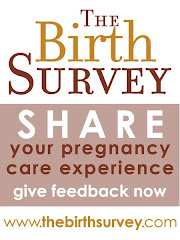 This article represents a serious attack on home birth and on patient
centered care in the United States. The attack is based on poor research and runs roughshod over established rights to bodily integrity.
This article represents a serious attack on home birth and on patient
centered care in the United States. The attack is based on poor research and runs roughshod over established rights to bodily integrity.This article was “Presented at European Congress of Perinatal Medicine, Paris, France, June 13, 2012.” So not only does the article attack home birth, it also represents an attempt to “export” to the rest of the world a position that the obstetric profession, not mothers, should have the final decision on birth, at a time when that isn’t even legally defensible here in the United States.
The primary author, a Fellow of ACOG, faculty member at Cornell University Department of Obstetrics and Gynecology, should be aware of American jurisprudence supporting patient autonomy and right to informed consent. We can also assume that he is aware that systems of midwife attended homebirth are well established and integrated into the health delivery systems of many European countries. And yet, it is the decision of the 2010 European Court of Human Rights case that seems to have prompted this “critical evaluation”. This was a case where obstetrician, Agnes Gereb, was imprisoned for attending home births in Hungary. Her story is told in the movie “Freedom for Birth”, produced by One World Birth.
The authors’ conclusion is the height of hubris: “We urge obstetricians, other concerned physicians, midwives and other obstetric providers, and their professional associations to eschew rights-based reductionism in the ethics of planned home birth and replace rights-based reductionism with an ethics based on professional responsibility.” In other words, reject the ethic that autonomy is a fundamental human right.
Who decides what is reasonable?
Fiduciary responsibility is, by definition, putting the needs of the patient first. If fiduciary responsibility was the same as professional responsibility, this would not be an either/or proposition. The author defines professional responsibility as a model of decision making where “the patient has the right to select from medically reasonable alternatives”. Who gets to decide what is reasonable? Why, the obstetrician, of course. And if the patient opts for an alternative the obstetrician has not deemed reasonable, then the obstetrician is justified in placing the “rights of the fetus” ahead of the rights of the first patient (the mother), although what is actually being asserted is the obstetrician’s own agenda over the rights of his/her patient.
Buried in this article, and lost in the conclusion, is one very true statement: “The first professional responsibility of obstetricians is to ensure that hospital delivery is safe, respectful, and compassionate.” The author goes on to describe what that needs to look like, and in an easily overlooked fashion concedes that hospitals aren’t always safe places either. In fact, both infant and maternal mortality are on the rise in the United States, at a time when hospitals have a near monopoly on birth. This failing falls squarely at the feet of ACOG and the collective actions of its Fellows, which calls to mind this quote:
“ACOG no longer has the moral authority to set standards in maternity care…. It has made too many self-aggrandizing and self-protective recommendations (e.g. against home birth, videotaping birth, and VBAC) that limit the freedom of American women and families.” (M. Wagner, Born In The USA, 2006, University of California Press, p. 32)
Overlooking this reality completely, the author also overlooks the most reliable research on the safety of home birth, while noting that ACOG “accepts the findings of Wax et al”, a thoroughly discredited piece of published research that does not stand as prima fascia evidence against the safety of home birth. Even Amy Tuteur (no friend to home birth) says this AJOG article is “poorly researched, relies on bad studies and is woefully paternalistic”.
One contradiction stands out as the authors call for “safe, respectful, and compassionate” hospital delivery. No hospital birth can be truly respectful if the birth is happening in the hospital because the physician disrespects the woman’s right to an alternative and has rigged the system to eliminate access to all legal alternatives.
Illinois Friends of Midwives also responds to this article, calling it “paternalistic and misogynistic."
Wendy Gordon, LM, CPM, MPH, Midwives Alliance Division of Research, published an in-depth response on Science and Sensibility.
Another resource in any discussion on the safety of birth, and home birth in particular, can be found on Citizens for Midwifery website.
Yours in safe and respectful maternity care,
Willa Powell & the CfM Team

SIGN UP HERE TO RECEIVE GRASSROOTS NEWS MESSAGES!
SHARE WITH OTHERS IN YOUR AREA!
Feel free to forward and share on facebook with friends, family and colleagues
SEND US NEWS!
If you find news, resources, or other valuable information that you think should be posted on the Grassroots Network, please send it to info@cfmidwifery. org... with "For the grassroots network" in the subject line. We will definitely consider using them!
LEARN ABOUT CfM!
Check out our website
Check out our blog
Like us on Facebook
Follow us on Twitter
GET INVOLVED!
Are you interested in volunteering with some dynamic women in a supportive environment?
Help CfM promote the Midwives Model of Care!
We have many ways to get more involved.
Get in touch with us!
DONATE!
CfM couldn't do it without your support.
Make your contribution here!













